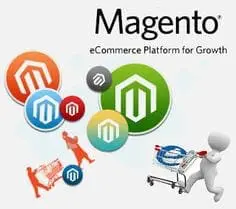For those of you asking what is eCommerce (also known as electronic commerce), well it’s is the process of completing a transaction over the internet. It is basically the term used for online shopping, where customers buy products and services from a retailer or other organisation on the web.
Sometimes products will be tangible goods that customers either pick up in-store or have delivered to their homes. Other times the products may be intangible e.g. music singles that are delivered as downloadable files. Many businesses also sell services over the net, which is also classed as a type of eCommerce.
Over the years, ecommerce shopping has become more and more popular with 95% of British people now buying goods online. One of the reasons eCommerce has become so popular is because it eliminates barriers of time and distance. Customers can shop online at any time of day or night and from anywhere in the world by simply connecting to the internet and visiting an etailer’s (the name given to online retailers) website.
More recently, we have seen a rising number of people shopping online using their smartphones and digital tablets (like iPads) allowing them to effectively complete transactions “on the go”. This is most definitely something eCommerce website owners need to keep in mind when choosing an eCommerce platform and building their website.
eCommerce is not only beneficial for customers in terms of convenience but also great for retailers. Whereas in the past businesses would have to raise the capital to rent a brick and mortar store, where they could sell their products, today they can simply setup their eCommerce business from home and save on the costs. Thanks to eCommerce, pretty much anyone, anywhere can set up a retail business, but in order for it to be a success they of course need to choose a great eCommerce platform and have an effective marketing strategy.
Magento eCommerce
When choosing an eCommerce platform today, business owners are well and truly spoilt. There are so many great offerings available including Shopify, Big Commerce, Pretashop and Woocommerce for WordPress, but experience has taught us that Magento nearly always comes out on top.
This is evident not only from our own experience with the platform, but also from looking at the figures, which show Magento to be the world’s leading enterprise-class eCommerce platform as well as being open source. It currently powers over two hundred thousand eCommerce websites.
Businesses though would rarely just choose Magento because others claim it is the best. They choose it because it has something to offer them, whether it is its powerful features, great flexibility, SEO benefits or all of the above. If businesses require more than the limited features and functionality offered by other eCommerce platforms on the market and want to invest in a platform that will continue meeting their needs both now and in the future, Magento is the most sensible choice.
Rather than simply telling you that the Magento eCommerce platform has more to offer than others in its category, we have listed a few of its unique and beneficial features below as examples:
- Supports multiple websites – Magento allows you to build multiple websites (using different languages and currencies) and run them from a single administration interface.
- Built in CMS – Magento has a built in content management system that allows businesses to create useful information pages and blog posts to improve their users’ experience and benefit from good SEO.
- Powerful SEO and marketing tools – Magento provides powerful SEO and marketing tools out-of-the-box, giving merchants the means to increase the visibility of their website online and make it a success.
If you are currently in the processing of deciding between ecommerce platforms, we recommend reading our Magento comparisons with other leading ecommerce platforms page to see how it compares. We have also written in-depth comparisons of Magento vs. Woocommerce, Magento vs. WordPress and Magento vs. Joomla.

A selection of our older posts, written by various members of the team between 2015 to 2021.






![15 Proven eCommerce SEO Strategies That Will Work in 2025 [UPDATED] eCommerce SEO strategies that work](https://ecommercedesign.agency/wp-content/smush-webp/2024/11/eCommerce-SEO-strategies-that-work-150x150.jpg.webp)



0 Comments